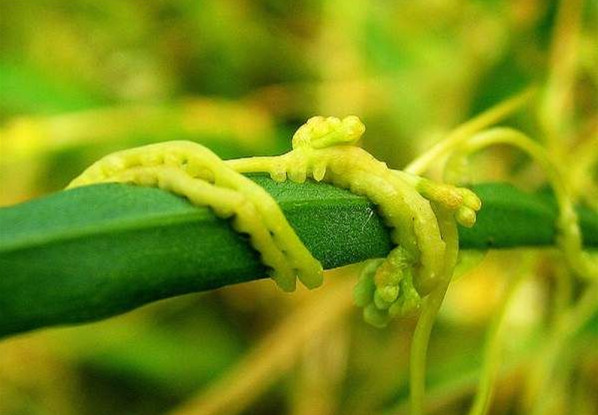Dodder seed, also known as cuscuta seed or Tu Si Zi in mandarin, has long been considered a fabulous mild tonic used in Chinese herbal remedies. Just as its name implies, it comes from a parasitic plant that only survives by absorbing the essence from its host. Since ancient herbalists found no root from dodder, they thought it had some kind of magic power. It may be for this reason that it was listed as one of the superior herbs in the "Shen Nong's Herbal Classic". Being an excellent tonic for kidney, liver, and spleen, traditionally dodder seeds, alone or in combination with other ingredients, can assist the treatment of various diseases, in particular Impotence, Nocturnal Emission, Alopecia Areata, habitual abortion, visual deterioration, frequent urination, melasma, lower back pain caused by kidney deficiency, chyluria, infertility, fetal irritability, and more.
In terms of medicinal purpose, it basically refers to the seeds of Cuscuta chinessis Lam., Cuscuta australis R. Br, or Cuscuta japonica Choisy. These three species are plants in the family Convolvulaceae. And other names of this plant and herb include Semen Cuscutae, witch's hair, hailweed, angel hair, goldthread, strangleweed, devil's ringlet, pull-down, devil's hair, love vine, devil's gut, hellbine, hairweed, and the like. When used as one of medicinal herbs, the aboveground part should be reaped and dried in autumn when the fruits are ripe. And the seeds are thus collected. Medicinally it is used raw or cooked and mashed.
CHINESE DODDER SEEDS BENEFITS
In traditional Chinese medicine, it is commonly used in the treatment of diseases like infertility and fetal irritability. And in recent years a lot of progress has been made on the researches of this herb. Now, let's take a look at its health benefits from the angles of the results of scientific research and TCM theory.

Dodder Seed
1) Effect on fertility.
Experiments show that its flavonoids have estrogen-like effects. Besides, it seems to have a protective role in human sperm. That's to say, its androgen-like action can protect the reproductive organs of male animals, promote the testicular development and the production of testosterone, and prevent the spermatogenic cell from oxidative damage and apoptosis;
2) Effect on bone and cartilage.
Animal studies have found that it can improve bone density and promote hyaline cartilage repair. In vitro culture of osteoblasts in its water extract shows that it can increase calcium matrix of osteoblasts, promote the proliferation, increase the alkaline phosphatase activity, inhibit osteoclast survival and induce the apoptosis of osteoclast;
3) Effect on cancer.
Experimental studies have found that it has the ability to inhibit certain cancer cells and thus reduce the incidence of cancer;
4) Effects on blood pressure and blood sugar.
After its polysaccharide was given to mouse models of diabetes by gavage administration, the improvements included significantly decreased blood glucose levels, increased body mass, and increased glycogen content. All indicates that it has anti- diabetic effect;
5) Anti-aging and antioxidant action.
Animal studies have shown that its polysaccharide can also delay aging and protect the brain tissue;
6) Effect on immunity.
Animal experiments showed that the right amount of dodder seeds can increase the wet weight of thymus and immune organ spleen and thereby enhance the phagocytosis of peritoneal macrophage, promote the proliferation of spleen lymphocytes and induce the generation of interleukin. As a result, it effectively enhances immunity;
7) Effect on liver.
After the mouse models of chronic liver injury were fed with its decoction, the improvements were significantly decreased alanine aminotransferase (ALT) and aspartate aminotransferase (AST) in serum, increased SOD, and markedly improved liver tissue injury;

![Diseases, Symptoms, tcm, [tcmwindow.com]](/uploadFile/adImg/2015/11/11/f5cbfcc0-4df5-4646-9b9a-f316651a0199.jpg)





